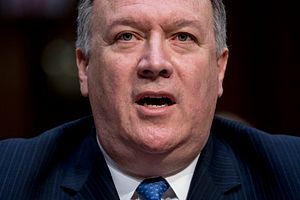On Tuesday, the U.S. government announced new visa bans on Chinese Communist Party officials connected to China’s system of mass detention of ethnic Uyghurs and other Muslim minorities in the Xinjiang Uyghur Autonomous Region.
The U.S. Department of State, in a release attributed to Secretary of State Mike Pompeo, said the restrictions will apply to “Chinese government and Communist Party officials who are believed to be responsible for, or complicit in, the detention or abuse of Uighurs, Kazakhs, or other members of Muslim minority groups in Xinjiang, China.” Family members of such officials would also be covered.
“The Chinese government has instituted a highly repressive campaign against Uighurs, ethnic Kazakhs, Kyrgyz, and other members of Muslim minority groups in the Xinjiang Uighur Autonomous Region (Xinjiang) that includes mass detentions in internment camps,” Pompeo said.
Pompeo also cited “pervasive, high-tech surveillance,” “draconian controls on expressions of cultural and religious identities,” and “coercion of individuals to return from abroad to an often perilous fate in China” as well.
The move by the U.S. State Department appears to be part of an inter-agency response to China’s repressive practices in Xinjiang. Pompeo underscored that the visa bans were complementary to separate action by the U.S. Department of Commerce applying export restrictions on U.S. products to several entities in Xinjiang, including “elements of the Public Security Bureau.”
“The United States calls on the People’s Republic of China to immediately end its campaign of repression in Xinjiang, release all those arbitrarily detained, and cease efforts to coerce members of Chinese Muslim minority groups residing abroad to return to China to face an uncertain fate,” Pompeo further said.
The list of Chinese officials affected by the new ban is not public.
The U.S. government and the United Nations estimate that more than 1 million ethnic Uyghurs and other minorities are being held by China in an expansive system of camps across Xinjiang. China officially calls these facilities “Vocational Education and Training Centers.”
The twin Commerce and State Department announcements on Xinjiang come shortly before the scheduled resumption of U.S.-China trade talks in Washington, D.C.
Earlier this year, a bipartisan group of U.S. lawmakers petitioned both Pompeo and U.S. Commerce Secretary Wilbur Ross to impose sanctions on specific members of the Chinese Communist Party in Xinjiang, including party chief Chen Quanguo.
“We are disappointed with the administration’s failure so far to impose any sanctions related to the ongoing systemic and egregious human rights abuses in Xinjiang,” the lawmakers said.

































